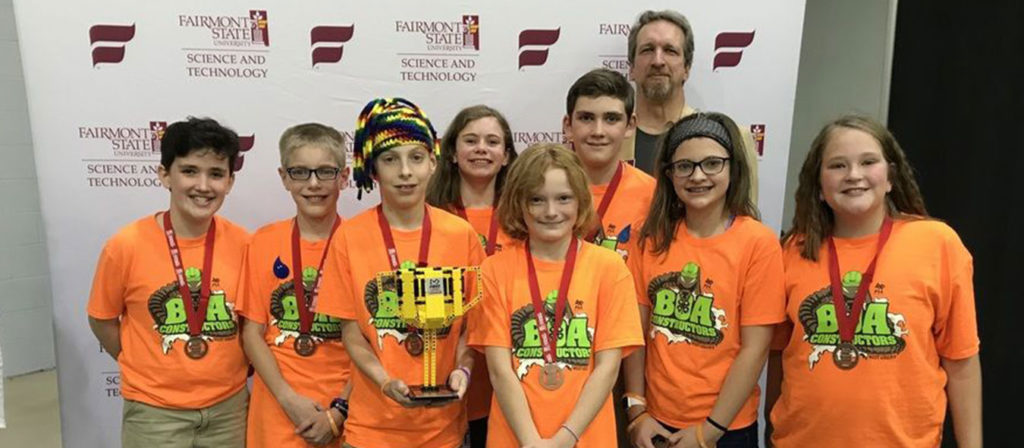They call themselves the Boa Constructors, and they’re a group of problem solvers, visionaries, researchers and fabricators — and that’s in addition to tackling the everyday ins and outs of homework and lunchroom social dynamics.
They’re serious about robotics, specifically FIRST Lego League competitions, where the team won first place at the statewide tournament in December and is preparing for a trip to compete against the best 100 robotics teams from all over the world in Detroit in April.
The group of middle schoolers come together a few hours a week through a West Virginia University Extension Service 4-H robotics club in Monroe County, which is nestled in the most extreme southeast corner of the state. By most accounts, the county is rural, with small farming communities tied together with a sense of local pride. Combine that with the core values of 4-H, and you get the secret of their success.
“A team that gels by listening to, and leaning on, each other while cooperatively learning and problem solving has a really good chance at being successful in these competitions,” said Jen Robertson-Honecker, WVU Extension Service 4-H STEM specialist. “The competition and the core values of these robotics programs align very closely to the core 4-H values, so it’s easy for 4-H’ers to get in there and feel at ease when it comes to teamwork and team-to-team work.”
The coach of the Boa Constructors, Johna Jackson, echoed the sentiment about 4-H being a good precursor for team dynamics.
“The 4-H programs in our area really help develop these kids and it’s an easy fit for them,” said Jackson. “They’re all very gifted and sometimes shy — but lessons learned through 4-H help them to flourish among themselves and to become well-spoken kids.”
Robertson-Honecker added that the competitions specifically are billed as “coopertitions” where one of the keys to judging a team overall is how they not only help each other, but also how they interact with their peers from other teams, such as loaning a different team parts if theirs break.
Competitions take place in four parts. In addition to the teamwork aspect, teams have to present on both their design concept and an accompanying research project. After that, it’s time for the robot game — where the robots come to life and make their way autonomously through the map exhibiting the programming and construction the teams worked on for months in advance.
According to Robertson-Honecker, there’s an emphasis on fun and everyone getting along, and each one of the kids can “go pro” eventually in STEM-related fields.
But, some of that can also be used not far from home right in Monroe County.
“We see a lot of these kids get interested in, and advance to, our high school robotics team, where the concepts are a lot more advanced and the platforms for building are more wide open,” said Jackson. “Not only can they go on with their education in STEM-related fields, but it also has a more practical application — bringing that technology to help on their family farm as agricultural machines get more advanced.”
It’s that sense of place that has the community invested in 4-H robotics programs, even if they have no idea about robotics.
“We get invited all the time to speak at churches and the like,” said Jackson. “And even though some of the people don’t know anything about robots or programming, they’re so impressed with what these kids are doing and they throw their full support behind them — to us, that’s absolutely priceless and we’re so thankful for it.”
As the team prepares for the world competition in Detroit, they’ve also set up a crowdfunding initiative through the WVU Foundation. The information for that is found athttps://advancing.wvu.edu/project/9291 and you can follow the group on Facebook as well.
For more than a century, 4-H has focused on agricultural science, electricity, mechanics, entrepreneurship and natural sciences. Today, 4-H out-of-school opportunities also exist in subjects like rocketry, robotics, biofuels, renewable energy and computer science.
To learn more about new opportunities in the 4-H program, visit www.extension.wvu.edu, or contact your local office of the WVU Extension Service. Keep up-to-date with the latest news through our Facebook and Twitter accounts at @WVUExtension.
(From WVU Extension Service).
